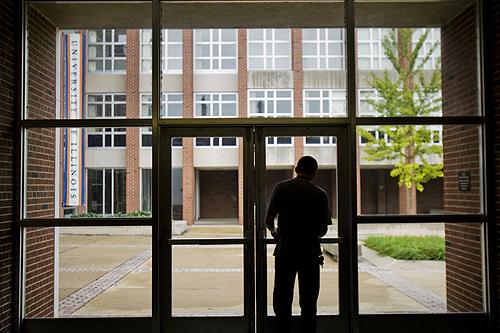Service workers seek negotiations

Erica Magda
Sep 11, 2007
Last updated on May 12, 2016 at 03:35 p.m.
Justus Fortado finishes locking up Wohlers Hall around 10 p.m., headphones around his neck and black fanny pack around his waist. The building and services worker at the University may look like anyone out for a walk on a clear September night, and he isn’t complaining about wages or his work between drags of a glowing Camel cigarette.
On this night the 13-year veteran is working a “swing” shift, filling in for another worker. Most building service and food service jobs have been assigned on a seniority basis; the longer a worker has been in the job the better chances he or she can work at a less physically demanding building.
But the University now wants to randomly assign where these workers go, regardless of seniority. Management styles and wage increases are the heart of the bargaining process between the SEIU Local 73 Chapter 119 union and the University, Fortado said.
Understaffing has forced some to work a night shift from 5 p.m. to 1 a.m., then work a day shift the next day.
Get The Daily Illini in your inbox!
These conflicts are not taken into consideration under the way the University and upper management have proposed scheduling, Fortado said.
The union, which represents both building and services workers and food service workers, and the University have attempted to come to terms for more than a year. The union voted overwhelmingly in favor of a three-day strike if the University doesn’t come to terms fast. Now, a federal mediator has been called in to act as an impartial third party to nudge the process along.
Local 73 is asking for a 2.5 percent increase in wages and back pay at that new amount from when its contract expired – July 30, 2006. Workers have since been working under the terms of the old contract.
Larry DuVall, Chapter 119 president, said that after a lot of talking in circles the University offered to meet the terms of the contract but only for building service workers, not food service workers.
“The main thing is the University is trying to get the members to fight amongst themselves over the proposals they have offered,” DuVall said. The University did offer bonuses of a few hundred dollars for others not back paid, he said.
Fortado said workers make around $15 an hour. According to the Bureau of Labor Statistics, the national average hourly wage for janitor positions in the 90th percentile as of May 2006 is $15.89. The median wage is $9.58. Wages nationally in the 90th percentile rose barely 2 percent each year from 2003 to 2005, and less than 2 percent in 2006.
Champaign-Urbana also ranks second nationally for janitorial “concentration of workers” in the area, down from number one in 2005.
Local 73 has its monthly membership meeting Sept. 15. DuVall said he will keep the membership informed of the negotiation status, and will hopefully have more information on when the mediator will be able to come down from Chicago to start the process.
The University does not comment to the media about contract negotiations. “But,” University spokesperson Robin Kaler said, “We are firm believers in collective bargaining though, and we think the process works very well.”
Fortado is confident that the federal mediator will help both sides reach a realistic consensus.
“There’s a demand for this type of work,” Fortado said. “But (the University) is not willing to pay for it. And frankly, you get what you pay for.”





